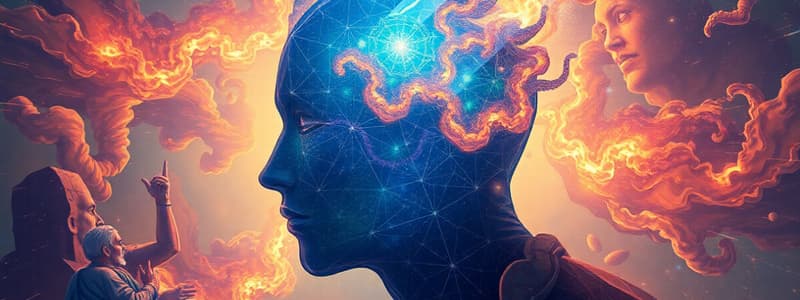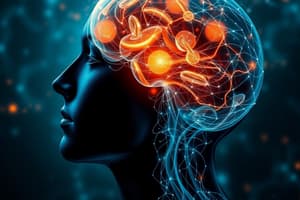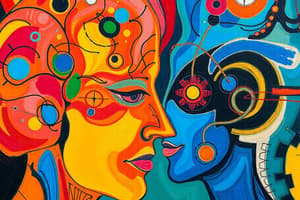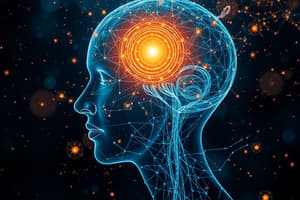Podcast
Questions and Answers
What is the primary effect of stimulants in the brain?
What is the primary effect of stimulants in the brain?
- They relieve pain and induce sedation.
- They cause dramatic changes in perception.
- They decrease dopamine and norepinephrine levels.
- They enhance euphoria and increase motivation. (correct)
Which of the following substances is classified as a narcotic?
Which of the following substances is classified as a narcotic?
- Psilocybin
- Heroin (correct)
- LSD
- THC
How do hallucinogens typically affect individuals?
How do hallucinogens typically affect individuals?
- They can cause visual and auditory hallucinations. (correct)
- They increase pain sensitivity.
- They impair short-term memory.
- They enhance physical coordination.
What is a characteristic of marijuana as a drug?
What is a characteristic of marijuana as a drug?
What does the term 'gateway drug' refer to?
What does the term 'gateway drug' refer to?
What is a primary function of depressants in relation to the central nervous system?
What is a primary function of depressants in relation to the central nervous system?
Which of the following is considered a type of stimulant?
Which of the following is considered a type of stimulant?
What does the expectancy theory suggest regarding alcohol effects?
What does the expectancy theory suggest regarding alcohol effects?
What condition is described by alcohol myopia?
What condition is described by alcohol myopia?
Which psychoactive drug is known as the 'king' of depressants?
Which psychoactive drug is known as the 'king' of depressants?
What is the purpose of the balanced placebo design?
What is the purpose of the balanced placebo design?
Which type of drug primarily helps in reducing tension and anxiety?
Which type of drug primarily helps in reducing tension and anxiety?
What term describes the physical vs psychological dependence on substances?
What term describes the physical vs psychological dependence on substances?
What is the primary purpose of the restorative theory of sleep?
What is the primary purpose of the restorative theory of sleep?
Which wave patterns in the brain are associated with REM sleep?
Which wave patterns in the brain are associated with REM sleep?
What occurs most often during REM sleep?
What occurs most often during REM sleep?
Which sleep disorder is characterized by difficulty staying or falling asleep?
Which sleep disorder is characterized by difficulty staying or falling asleep?
What is the function of an electrooculograph (EOG)?
What is the function of an electrooculograph (EOG)?
In Freud's theory, what does the manifest content of a dream represent?
In Freud's theory, what does the manifest content of a dream represent?
What does consciousness primarily refer to?
What does consciousness primarily refer to?
Which principle of consciousness describes its tendency to change?
Which principle of consciousness describes its tendency to change?
Which statement is true regarding the effects of REM sleep deprivation?
Which statement is true regarding the effects of REM sleep deprivation?
What is the 'rebound effect of thought suppression'?
What is the 'rebound effect of thought suppression'?
What characterizes night terrors?
What characterizes night terrors?
What is meant by 'dynamic unconscious' according to Freud?
What is meant by 'dynamic unconscious' according to Freud?
Which term describes the relationship between mental events and brain events in contemporary views?
Which term describes the relationship between mental events and brain events in contemporary views?
What does 'selectivity' in consciousness allow for?
What does 'selectivity' in consciousness allow for?
In the context of cognitive unconscious, what differentiates between 'System 1' and 'System 2'?
In the context of cognitive unconscious, what differentiates between 'System 1' and 'System 2'?
What condition is associated with altered states of consciousness during sleep?
What condition is associated with altered states of consciousness during sleep?
Which level of consciousness involves awareness of one's self and thoughts?
Which level of consciousness involves awareness of one's self and thoughts?
Thought suppression is best described as:
Thought suppression is best described as:
Which of the following substances is considered to be a gateway drug?
Which of the following substances is considered to be a gateway drug?
What is a notable common effect of stimulants on mood and behavior?
What is a notable common effect of stimulants on mood and behavior?
Which class of drugs includes substances that alter sensory perception and may cause hallucinations?
Which class of drugs includes substances that alter sensory perception and may cause hallucinations?
What is a key property of narcotics in relation to pain?
What is a key property of narcotics in relation to pain?
How does the harm reduction approach address high-risk behaviors?
How does the harm reduction approach address high-risk behaviors?
Which stage of sleep is most associated with dreaming?
Which stage of sleep is most associated with dreaming?
What is a common characteristic of night terrors?
What is a common characteristic of night terrors?
How does sleep deprivation specifically affect memory?
How does sleep deprivation specifically affect memory?
Which of the following describes the function of the electrooculograph (EOG)?
Which of the following describes the function of the electrooculograph (EOG)?
According to Freudian theory, what does latent content represent in dreams?
According to Freudian theory, what does latent content represent in dreams?
What does the activation-synthesis model propose about dreams?
What does the activation-synthesis model propose about dreams?
What is a defining feature of circadian rhythms?
What is a defining feature of circadian rhythms?
What is the main function of depressants in relation to the central nervous system?
What is the main function of depressants in relation to the central nervous system?
Which of the following statements accurately describes alcohol myopia?
Which of the following statements accurately describes alcohol myopia?
Which psychoactive drug is often referred to as the 'king' of depressants?
Which psychoactive drug is often referred to as the 'king' of depressants?
What role do fMRI scans play in the study of dreams?
What role do fMRI scans play in the study of dreams?
What does expectancy theory suggest about alcohol effects?
What does expectancy theory suggest about alcohol effects?
Which of the following substances is classified as a stimulant?
Which of the following substances is classified as a stimulant?
What characteristics differentiate barbiturates from benzodiazepines?
What characteristics differentiate barbiturates from benzodiazepines?
Which type of drugs are considered toxic inhalants?
Which type of drugs are considered toxic inhalants?
What does the term 'intentionality' in consciousness refer to?
What does the term 'intentionality' in consciousness refer to?
Which statement best describes the 'transience' principle of consciousness?
Which statement best describes the 'transience' principle of consciousness?
Which level of consciousness involves a heightened sense of self-awareness?
Which level of consciousness involves a heightened sense of self-awareness?
Which concept refers to the mental process that keeps unacceptable thoughts and memories out of consciousness?
Which concept refers to the mental process that keeps unacceptable thoughts and memories out of consciousness?
What is the primary characteristic of the dynamic unconscious as described by Freud?
What is the primary characteristic of the dynamic unconscious as described by Freud?
What occurs as a result of thought suppression, according to the rebound effect?
What occurs as a result of thought suppression, according to the rebound effect?
According to modern views, how do mental events relate to brain events?
According to modern views, how do mental events relate to brain events?
What distinguishes 'System 1' from 'System 2' in dual process theories?
What distinguishes 'System 1' from 'System 2' in dual process theories?
What best describes an altered state of consciousness?
What best describes an altered state of consciousness?
What principle of consciousness allows individuals to focus on certain objects while ignoring others?
What principle of consciousness allows individuals to focus on certain objects while ignoring others?
Flashcards
Consciousness
Consciousness
A person's subjective experience of the world and their mind.
Phenomenology
Phenomenology
How things appear to a conscious person.
Problem of other minds
Problem of other minds
The difficulty of knowing if other people are conscious.
Mind-body problem
Mind-body problem
Signup and view all the flashcards
Intentionality (consciousness)
Intentionality (consciousness)
Signup and view all the flashcards
Unity (consciousness)
Unity (consciousness)
Signup and view all the flashcards
Selectivity (consciousness)
Selectivity (consciousness)
Signup and view all the flashcards
Transience (consciousness)
Transience (consciousness)
Signup and view all the flashcards
Thought suppression
Thought suppression
Signup and view all the flashcards
Rebound effect
Rebound effect
Signup and view all the flashcards
Adaptive Theory of Sleep
Adaptive Theory of Sleep
Signup and view all the flashcards
Restorative Theory of Sleep
Restorative Theory of Sleep
Signup and view all the flashcards
Circadian Rhythm
Circadian Rhythm
Signup and view all the flashcards
REM Sleep
REM Sleep
Signup and view all the flashcards
Sleep Apnea
Sleep Apnea
Signup and view all the flashcards
Insomnia
Insomnia
Signup and view all the flashcards
Manifest Content (dreams)
Manifest Content (dreams)
Signup and view all the flashcards
Latent Content (dreams)
Latent Content (dreams)
Signup and view all the flashcards
Dream Theory
Dream Theory
Signup and view all the flashcards
Activation During Sleep
Activation During Sleep
Signup and view all the flashcards
What does alcohol do?
What does alcohol do?
Signup and view all the flashcards
Expectancy Theory
Expectancy Theory
Signup and view all the flashcards
Balanced Placebo Design
Balanced Placebo Design
Signup and view all the flashcards
Alcohol Myopia
Alcohol Myopia
Signup and view all the flashcards
Stimulants
Stimulants
Signup and view all the flashcards
Types of Stimulants
Types of Stimulants
Signup and view all the flashcards
Narcotics (Opiates)
Narcotics (Opiates)
Signup and view all the flashcards
Hallucinogens
Hallucinogens
Signup and view all the flashcards
Marijuana (THC)
Marijuana (THC)
Signup and view all the flashcards
Gateway Drug
Gateway Drug
Signup and view all the flashcards
What is the problem of other minds?
What is the problem of other minds?
Signup and view all the flashcards
How is the mind-body problem explained?
How is the mind-body problem explained?
Signup and view all the flashcards
What is the rebound effect?
What is the rebound effect?
Signup and view all the flashcards
What is the dynamic unconscious?
What is the dynamic unconscious?
Signup and view all the flashcards
What are dual process theories?
What are dual process theories?
Signup and view all the flashcards
What is an altered state of consciousness?
What is an altered state of consciousness?
Signup and view all the flashcards
What is the adaptive theory of sleep?
What is the adaptive theory of sleep?
Signup and view all the flashcards
What is the restorative theory of sleep?
What is the restorative theory of sleep?
Signup and view all the flashcards
What is REM sleep?
What is REM sleep?
Signup and view all the flashcards
What is sleep apnea?
What is sleep apnea?
Signup and view all the flashcards
EEG Stages
EEG Stages
Signup and view all the flashcards
Sleep Deprivation
Sleep Deprivation
Signup and view all the flashcards
Manifest vs. Latent Content
Manifest vs. Latent Content
Signup and view all the flashcards
Narcotics
Narcotics
Signup and view all the flashcards
Marijuana
Marijuana
Signup and view all the flashcards
What are stimulants?
What are stimulants?
Signup and view all the flashcards
What are depressants?
What are depressants?
Signup and view all the flashcards
What are some types of depressants?
What are some types of depressants?
Signup and view all the flashcards
What are some types of stimulants?
What are some types of stimulants?
Signup and view all the flashcards
Study Notes
Consciousness
- Consciousness: a person's subjective experience of the world and the mind
- Phenomenology: how things seem to a conscious person
Mysteries of Consciousness
- The Problem of Other Minds: fundamental difficulty in perceiving the consciousness of others
- People judge minds based on capacity for experience and capacity for
- The Mind-Body Problem: how the mind is related to the brain and body
- Descartes' view: the pineal gland
- Contemporary view: mental events are intimately tied to brain events
Four Basic Principles of Consciousness
- Intentionality: being directed toward an object
- Unity: resistance to division
- Selectivity: capacity to include some objects but not others
- Transience: tendency to change
Levels of Consciousness
- Consciousness ranges in levels from minimal to full to self-consciousness
- Minimal consciousness
- Full consciousness
- Self-consciousness
Suppressing Thoughts
- Mental control: attempts to change conscious states of mind
- Thought suppression: conscious avoidance of a thought
- Rebound effect of thought suppression: tendency of a thought to return to consciousness with increased frequency following suppression
The Unconscious Mind
- Dynamic unconscious: an active system encompassing lifetime memories, deepest instincts and desires, and inner struggle to control these forces
- Freudian slips found in speech
- Repression: mental process that removes unacceptable thoughts and memories from consciousness
A Modern View of the Cognitive Unconscious
- Cognitive unconscious: all mental processes that give rise to a person's thoughts, choices, emotions, and behaviour
- Dual process theories: two different systems (fast, automatic and unconscious processing; and slow, effortful and conscious processing)
- Kahneman (2001): Systems 1 and 2
Sleep and Dreaming
- Altered state of consciousness: a form of experience that departs from normal subjective experience of the world and the mind
- Can be accompanied by changes in thinking, disturbances in sense of time, feelings of loss of control, and changes in emotional expression
- Alterations in body image and sense of self; perceptual distortions; and changes in meaning or significance
Sleep
- Adaptive theory of sleep: sleep as an evolutionary outcome of self-preservation
- Restorative theory of sleep: sleep that allows the brain and body to restore certain depleted chemical resources while eliminating chemical wastes
Sleep Cycle
- Circadian rhythm: naturally occurring 24-hour cycle
- Brain shows EEG changes in beta, alpha, theta, and delta waves
- Five stages of sleep (stages 1-4 and REM sleep)
- REM sleep: a stage characterized by rapid eye movements and high brain activity
- Dreaming occurs most often in REM stage
- Body becomes immobilized
- EOG (electrooculograph): instrument that measures eye movements
Sleep Needs and Deprivation
- Across a lifetime, about an hour of sleep is needed for every two hours awake
- Memories deteriorate unless sleep occurs
- REM sleep deprivation has the most detrimental effects, followed by slow-wave sleep (stages 3 and 4) deprivation
Sleep Disorders
- Insomnia: difficulty in falling asleep or staying asleep
- Sleep apnea: person stops breathing for brief periods while asleep
- Somnambulism (sleepwalking): occurs when a person arises and walks around during sleep
- Narcolepsy: disorder with sudden sleep attacks in the middle of waking activities
- Sleep paralysis: experience of waking up unable to move
- Night terrors (sleep terrors): abrupt awakenings with panic and intense emotional arousal
Dreams
- Characteristics distinguishing dreaming from waking consciousness: intense emotion, illogical thought, meaningful sensation, uncritical acceptance, and difficulty remembering dreams on waking
Dream Theories
- Freud's view: dreams have meaning
- Manifest content: dream's apparent topic or superficial meaning
- Latent content: dream's true underlying meaning
- Activation-synthesis model: brain imposes meaning on random neural activity
- Theory explaining dreams as brain attempting to make sense of random activation during sleep
- fMRI scans of brains during dreaming show increased activity in brain areas involved with emotion and visual imagery, but not in the prefrontal cortex (planning)
Drugs and Consciousness
- Levels of involvement in substance use, including intoxication, abuse, dependence, tolerance, withdrawal, and addiction; physical vs. psychological dependence
- Depressants: substances that slow down or curb activity of the central nervous system (reduces feelings of anxiety, slows movement, and impairs cognitive processes, high doses can cause death) · Alcohol: the 'king' of depressants, and effects can be influenced by expectations (expectancy theory and balanced placebo design) · Alcohol myopia: condition where alcohol hampers attention leading people to respond in simple ways to complex situations
- Barbiturates: sleeping aids and surgical anestheticts (Seconal and Nembutal); Less common than alcohol, but still used and abused
- Benzodiazepines: minor tranquilizers like Valium and Xanax
- Toxic inhalants: easily accessible substances (glue, hairspray, nail polish remover, gasoline)
- Stimulants: drugs that excite central nervous system, heighten arousal, and increase activity levels · Examples: caffeine, amphetamines, nicotine, cocaine, modafinil (and Ecstacy = MDMA) · Stimulants elicit euphoria and confidence/motivation
- Narcotics (opiates): highly addictive drugs derived from opium that relieve pain (e.g., heroin, morphine, methadone, codeine); closely related to endorphins
- Hallucinogens: drugs that alter sensation and perception; often cause visual and auditory hallucinations (examples: LSD (acid), mescaline, psilocybin, PCP, and ketamine)
- Marijuana: leaves and buds of hemp plant containing tetrahydrocannabinol (THC); produces mild hallucinogenic intoxication; impairs judgment, short-term memory, motor skills, and coordination; considered a gateway drug (with alcohol and tobacco)
Studying That Suits You
Use AI to generate personalized quizzes and flashcards to suit your learning preferences.




